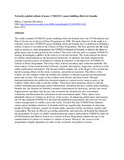| dc.description.abstract | This study examines UNESCO's peace-building efforts in Somalia since the UN Declaration and Plan of Action on a Culture of Peace Programme in 1999. The main objective of the study is to critically assess how UNESCO's peace-building efforts in Somalia have contributed to building a culture of peace as envision in the Culture of Peace Programme. The Key question that the study seeks to answer is; what programmes has UNESCO initiated in Somalia to address the threat to global peace and security posed by the conflict?
The study will also seek to examine UNESCO's strategy in managing conflicts in the context of war tom societies. The study utilized the theory of conflict transformation as the theoretical framework. In addition, the study employed the concept of positive peace as defined by Galtung in reference to the objectives of UNESCO's Culture of Peace Programme. The study solely utilized secondary data collection methods. The main sources of data used included textbooks, journals, newspapers, magazines, archival records, online publications and reports.
The Somali conflict remains one of the largest civil war that has had devastating effects on the social, economic, and political structures. The effects of the conflict are not confined within the borders but continue to threaten regional and international peace and security. The causes of the conflict seem diverse and deep rooted. Through internationalization the conflict has attracted numerous external actors; some as party to the conflicts while others seek to end the conflict. There have been numerous efforts to end the conflict including peacekeeping, peace enforcement, mediation and post-conflict peace-building. Despite this, the situation in Somalia is remains characterized by insecurity, poverty and social fragmentation a problem that has not only worsened the situation but also exacerbated criminality and threatened the realization on universal human rights. These aspects have inhabited cultures of violence at all levels of the society.
In enhancing global peace and security, the UN has mandated UNESCO to develop and implement programmes that advocate for non-violent management of conflict across the world. Towards this end, UNESCO has initiated various peace-building initiatives in Somalia which are significantly dependant on educating people to further tolerance, respect for human rights, peaceful conflict resolution, equality and cooperation. The lack of effective governing institutions and insecurity in Somalia has hindered the programme.
In terms of conflict transformation the aspects addressed by UNESCO under the UN Declaration and Plan of Action on a Culture of Peace Programme remain relevant to the transformation of cultures of violence to cultures of peace. However, the success of the programme is highly dependent on other social, economic and political systems. | en_US |

